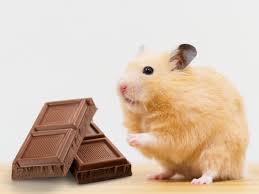Introduction
It can be generally agreed that chocolate is one of the sweetest, gland-exploding, and sticky desserts known to man. Its sticky gum-like consistency makes it a very delightful treat for children and adults alike. It is one known flavor that sits on almost every dessert table. However, as much as you may enjoy chocolates as a person, you may want to consider feeding them to your hamster, but please don’t!
While chocolates may be delicious and, most times, healthy for humans, they are not the best choice for your hamster.
If you are a parent or have children living around, you need to caution and enlighten them on why hamsters should not be fed chocolates. Let them know that chocolate is deadly for hamsters, unlike in humans, and it is best to avoid it at all costs for your hamster. This article will discuss in details why chocolate is not good for your hamster and how to know if your hamster has ingested a chocolate.
See Is cheese good for hamsters
Why Chocolate Is Not Good For Hamsters
Chocolate consists of theobromine and caffeine. These two substances have no dangerous effect in the human body, but it has an opposite impact on hamsters. Theobromine is known as the primary alkaloid in cacao bean plants used to make chocolate. It becomes difficult to break down or digest when consumed by a hamster due to its tiny size. Caffeine also has terrible effects like highly induced stress levels, which can lead to heart failure. Naturally, human beings enjoy the effects of these two combinations. It increases the heart rate, and our energy levels go up, causing us to focus more on work and have great energy throughout the day. But this is not the same for your pet as chocolate has an adverse effect on hamsters. It is common knowledge that chocolate is quite bad for dogs, but you should note that it is quite worse for your hamster. Hamsters are so small with an equally small digestive system that it takes them a long time to get these chemicals out of their system. Caffeine, for instance, makes a person active, but if consumed by a hamster, the hamster will break down with fatigue. The chemical contents in Theobromine, once found in a hamster’s digestive system, can lead to certain symptoms like diarrhea and frequent urinating. This is a bad sign in your hamster’s health. Even in the smallest of portions, your hamster is still in danger.
Read about some important things to know before adopting an hamster
How To Know If Your Hamster Has Consumed Any Chocolate
Like most pets, hamsters need a bit of freedom for a happier and healthier life. If a big enclosure with climbing stations and toys is not available, then you will need to let them out of their cage once in a while so that they can move around the house. This is inevitable if you have kids because they will want to spend time playing with the hamster out of its cage, so you won’t be able to lock it up permanently in a cage. And if your pet moves around from time to time, they will pick up things to eat from anywhere, just like babies. If your hamster eats chocolate, it will most likely begin to show some of the symptoms previously discussed, such as extreme fatigue, diarrhea, and excessive urinating. This is why attention is meant to be paid to your hamster daily.
Check their cages for signs of watery stools and urine smell, and if you notice any of these symptoms, then your pet has either eaten chocolate or something equally harmful. In this case, you need to take your hamster to see a vet.
Also, read about Is bread good for hamsters.
What Should You Do If Your Hamster Has Eaten Any Chocolate
If you notice your hamster has eaten chocolate from off the floor or table, you have to consider two things:
Did your hamster eat dark chocolate or milk chocolate?
While both types are harmful to your pet, dark chocolate will have a more drastic effect on them. This is due to the higher quantity of chocolate (caffeine and theobromine) in dark ones than milk chocolate, which has milk.
What to do if your hamster has eaten chocolate?
The first step is to give them water and some fruit or vegetables; this can help clear down the chemicals from their system.
You should also observe your hamster for the next few hours to note if any changes occur. You may notice some activity in your pet, like playing or climbing, as a result of the caffeine consumed, but you should wait for the aftermath of these activities. If your hamster gets diarrhea or urinates a lot after, you should take it to see a vet immediately.
How To Prevent Your Hamster From Eating Chocolate
Hamsters are not human beings; they can neither speak to you nor understand you, so do not expect any effort from them. It is solely your responsibility to make sure that there are no chocolate pieces carelessly thrown around.
If you live alone, this will be a lot easier to achieve because you can simply put your chocolate boxes in the fridge or a closed cupboard.
Properly dispose off chocolate wraps and keep your bin always closed, so your hamster doesn’t go sniffing around it.
If you have kids, you can teach them how to be more careful with chocolate around hamsters. Let them know the consequences of giving hamsters chocolate. You should also supervise them when they feed or play with the hamster.
Conclusion
Knowing what your hamster should or should not eat is an essential part of ensuring that your pets have a healthy and happy life. Under close observation, they can live up to their full capacity of about two years and, in some cases, three years.
See also Is broccoli good for hamsters‘.

